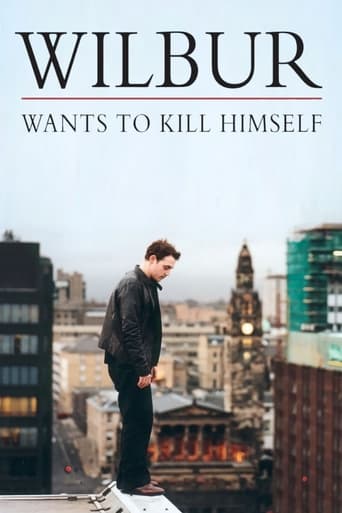anniemarshallster
The fact that this film is charming and funny shouldn't put you off. The humour is as dry as the best martini. Doctor to Harper: Was your father unhappy? Harper: Noooo - he always whistled at breakfast. Somehow this non sequitur cracks me up. It typifies so much of the dialogue each line of which slides past the other on a slightly different set of tram lines - close but not touching. So if this is Danish humour bring on the Union of Scotland and Denmark. And the women in this film - oh dear, the women. They are all extraordinarily manipulative, in the nicest possible way. Some of them are more desperate than others, their hair giving them away. One of them has devised a very seductive cleaning technique which involves climbing on desks and showing a nice section of leg. Well, whatever works! In the end it's a case of grow up or die and Wilbur makes his choice. I wonder whether Bill Forsyth has seen this movie?
Gordon-11
This film is about the life of a man who looks after his suicidal brother, after their parents passed away."Wilbur Wants to Kill Himself" has a very engaging plot. The characters are all portrayed so well that makes you care about them very much. Several scenes are particularly effective, such as the heartbreaking cries of finding Wilbur in the bathtub, or the awkward silences in the Chinese restaurant. The emotional journeys of the characters are also very interesting, as two of the main characters go through from one affective state to another as the film progresses. In addition, a person who should be positive (the nurse) has a strikingly negative view of life, while the person who is expected to be negative remains so positive and psychologically strong. "Wilbur Wants to Kill Himself" is a very interesting and engaging look at the psychological journey of a troubled family.
Henry Fields
"Wilbur wants to kill himself" is a (so)moving parable about how easy is to let yourself die when everything seems meaningless and how hard is to live when a disease is mining you. Wilbur looks like a nice guy, the kind of man women like, he's good-looking, he has a brother who loves him... it doesn't seem like his existence is that miserable. Nevertheless he wants to leave this world, that's one of men's last rights so he'll try to kill himself in any possible way. On the contrary, his brother Harbour is full of life, he's an enthusiastic person, he's in love and he's just get married... how ironic, he has an incurable cancer, but that won't stop him from clinging to life till the last consequences. Scherfig has moved away from the stupid DOGMA corset, and creates a perfect balance between the smile and the crying, tenderness and misanthropy, between life and death. She reduces the roughness of the hardest moments with a sarcastic turn or relying on the darkest sense of humor (that's always the best antidote against tragedy). Step by step she shows Wilbur the right way (and to all of us). No moral judgments, no dogmatism... there's no need to. Wilbur is a celebration of life, but is also a show of respect for those who don't wanna live anymore. Eventually it is a celebration of the best cinema: the one that makes you feel better. *My rate: 8.5/10
shecrab
Wilbur, who is seemingly unreasonably yet persistently suicidal, cannot live with himself. Harbour, his caring and gentle brother, can't live without Wilbur. The deaths of their parents has affected both brothers differently, making one unable to live normally, and the other unable to live without the abnormality of having someone to care for. Into this dysfunction comes Alice, a struggling single parent who has a sad sweetness that Harbour cannot resist. They woo, and marry, and as their happiness begins to infuse the lives of all four, a family begins to take shape, despite the resistance that each feels. It is from the quadrangle they form that Wilbur finally finds what is missing in his own life, and wants what his brother has so easily grasped: that love, in the forms and shapes around us, is all that will eventually make life worth living. So enlightened, he unwittingly grabs hold of his brother's love, and takes some for his own; Alice, though guilty, is not unwilling. She has fallen in love with both brothers, equally, but differently. Her daughter, somewhat underplayed, becomes a pivot around which the three focus their energies, trying desperately not to hurt each other anymore than will be absolutely necessary. A bit of deus ex machina takes over (or perhaps it is simply fate stepping in?) and Harbour must bow out due to incurable cancer of the pancreas. It's hard to watch both the despair, as well as hope, rising in both Wilbur's and Alice's eyes as they find out what the ultimate conclusion will be; and they struggle with both their guilt and their excitement. But Alice does not waiver in her love for Harbour, and even though they /can/ hurt him, neither she nor Wilbur is willing to go that far. What will become of Wilbur and Alice and the child? It is not obvious. It hurts to watch the transitions each makes in their thought processes at times, but would any of us have done any differently? Still, there is satisfaction in the ending and one is left with the aftertaste of something larger than oneself probably knowing more and better than we do. Though the story can be a bit contrived, it is worth watching. We aren't brought to tears by the poignancy, nor are we appalled by the actions of the characters; we are simply aware that they are human,and fallible. That's enough sometimes.


